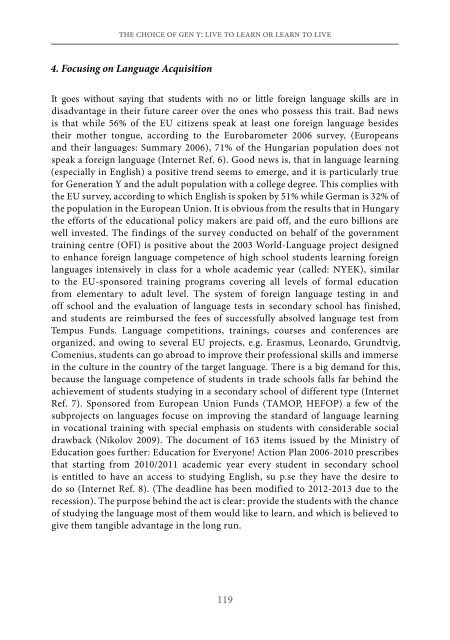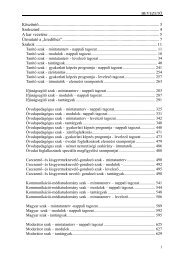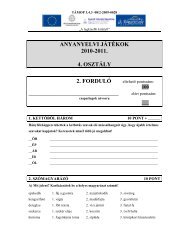ACTA SZEKSZARDIENSIUM - Pécsi Tudományegyetem Illyés Gyula ...
ACTA SZEKSZARDIENSIUM - Pécsi Tudományegyetem Illyés Gyula ...
ACTA SZEKSZARDIENSIUM - Pécsi Tudományegyetem Illyés Gyula ...
Create successful ePaper yourself
Turn your PDF publications into a flip-book with our unique Google optimized e-Paper software.
the choice of gen y: live to learn or learn to live<br />
4. Focusing on Language Acquisition<br />
It goes without saying that students with no or little foreign language skills are in<br />
disadvantage in their future career over the ones who possess this trait. Bad news<br />
is that while 56% of the EU citizens speak at least one foreign language besides<br />
their mother tongue, according to the Eurobarometer 2006 survey, (Europeans<br />
and their languages: Summary 2006), 71% of the Hungarian population does not<br />
speak a foreign language (Internet Ref. 6). Good news is, that in language learning<br />
(especially in English) a positive trend seems to emerge, and it is particularly true<br />
for Generation Y and the adult population with a college degree. This complies with<br />
the EU survey, according to which English is spoken by 51% while German is 32% of<br />
the population in the European Union. It is obvious from the results that in Hungary<br />
the efforts of the educational policy makers are paid off, and the euro billions are<br />
well invested. The findings of the survey conducted on behalf of the government<br />
training centre (OFI) is positive about the 2003 World-Language project designed<br />
to enhance foreign language competence of high school students learning foreign<br />
languages intensively in class for a whole academic year (called: NYEK), similar<br />
to the EU-sponsored training programs covering all levels of formal education<br />
from elementary to adult level. The system of foreign language testing in and<br />
off school and the evaluation of language tests in secondary school has finished,<br />
and students are reimbursed the fees of successfully absolved language test from<br />
Tempus Funds. Language competitions, trainings, courses and conferences are<br />
organized, and owing to several EU projects, e.g. Erasmus, Leonardo, Grundtvig,<br />
Comenius, students can go abroad to improve their professional skills and immerse<br />
in the culture in the country of the target language. There is a big demand for this,<br />
because the language competence of students in trade schools falls far behind the<br />
achievement of students studying in a secondary school of different type (Internet<br />
Ref. 7). Sponsored from European Union Funds (TAMOP, HEFOP) a few of the<br />
subprojects on languages focuse on improving the standard of language learning<br />
in vocational training with special emphasis on students with considerable social<br />
drawback (Nikolov 2009). The document of 163 items issued by the Ministry of<br />
Education goes further: Education for Everyone! Action Plan 2006-2010 prescribes<br />
that starting from 2010/2011 academic year every student in secondary school<br />
is entitled to have an access to studying English, su p.se they have the desire to<br />
do so (Internet Ref. 8). (The deadline has been modified to 2012-2013 due to the<br />
recession). The purpose behind the act is clear: provide the students with the chance<br />
of studying the language most of them would like to learn, and which is believed to<br />
give them tangible advantage in the long run.<br />
119




